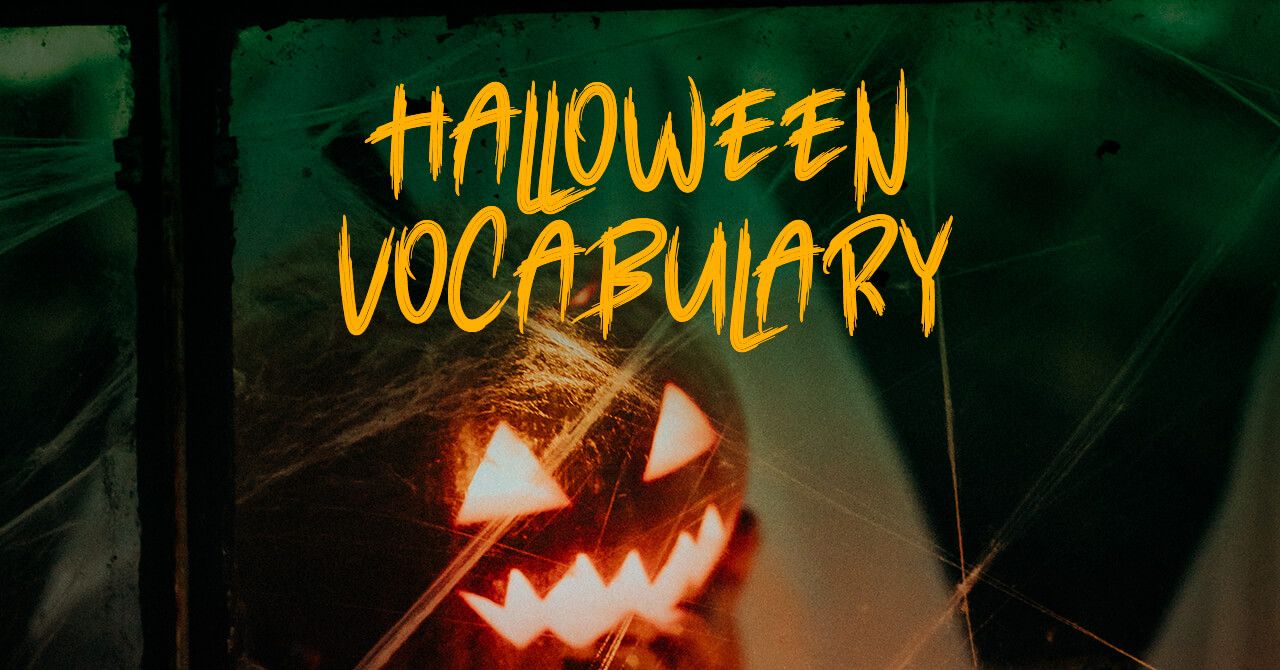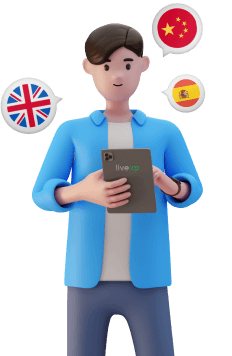
Top 15 Scary Words, Creepy Phrases, and Horror Expressions to Use this Halloween
Halloween calls for specific verbiage. Some of those words you already know and use. In addition to them, here are some less-known—but equally scary—words to enrich your Halloween vocabulary.

Get a FREE guide!
Want to sound like a native English speaker?
Get our free PDF with top tips that work.

Check your email!
Halloween is almost here, and it’s time to come up with some original puns to greet your friends. The task is getting more difficult each year. The words like spooky and creepy (not to mention scary) are so worn out and boring, and you won’t produce any effect by using them.
Luckily, there are many alternatives you can include in your greetings—or, perhaps, an original horror story.
What is Halloween?
Halloween is a night of “All Hollows.” Its etymology suggests that it should be devoted to Christian saints and martyrs. But it isn’t anymore (if it ever was). Instead, it is a parodical celebration of death. It includes elements of various international cults of death but doesn’t take them seriously. Instead, it mocks things like corpses, witches, supernatural beings, and other creepy stuff.
Halloween calls for specific verbiage. Some of those words you already know and use. In addition to them, here are some less-known—but equally scary—words to enrich your Halloween vocabulary.
Horror-Inducing Halloween Words
1. Eerie
When talking or writing about anything weird, mysterious, shocking, and creepy at the same time—whether it’s a sound, sight, smell, or any other sensation—we can describe it as eerie. It is something scary and unearthly that scares us to the bone.
Example of the word “eerie” in a sentence:
A loud, eerie sound woke them up in the middle of the night.
2. Ghoulish
Besides being another word for spooky, ugly, and gruesome, ghoulish refers to the features of a mythical creature called Ghoul. In pre-Islamic Arabian mythology, a Ghoul was a creature that lived in a graveyard and consumed corpses. In addition to vampires and zombies, ghouls are one of the most popular Halloween monsters.
Example of the word “ghoulish” in a sentence:
I couldn’t stop thinking about the ghoulish creatures of the mythical underworld.
3. Grotesque
More than just ugly, grotesque is distorted, disgusting, and sometimes horrifying. It can describe a work of art, a building, or a creature that looks so awful and bizarre that makes us feel disgusted and/or scared. Halloween costumes and cakes are often grotesque on purpose.
Example of the word “grotesque” in a sentence:
There was a competition that featured the most grotesque Halloween costumes.
4. Incantation
Witches’ chants—or incantations—are not pleasant to hear at night. They always make the atmosphere more creepy and are great to include in a Halloween performance.
Example of the word “incantation” in a sentence:
On the top of the hill, a congregation of witches chanted threatening incantations.
5. Levitation
Levitation is a supernatural movement. It levitates when a creature is up and approaching without using its legs or when an invisible force lifts an object. That’s how ghosts move stuff and themselves.
Example of the word “levitation” in a sentence:
The ghoulish creature levitated a couple of feet above the ground, scaring the hell out of us.
6. Macabre
This term usually describes novels and stories—such as those of E.A. Poe and Stephen King—depicting death’s atmosphere. In medieval literature, Danse Macabre (Dance of Death) was a popular theme that reminded the audience that no one had escaped death. The synonyms of macabre are ghastly and grim.
Example of the word “macabre” in a sentence:
Ghastly characters and macabre scenes make his books so deeply disturbing.
7. Ominous
This term is simple; ominous is threatening, like a bad omen.
Example of the word “ominous” in a sentence:
The ominous sounds were approaching, and they had nowhere to hide.
8. Orb
An orb is any ball-like object. It comes from the Latin “orbem,” which means “circle.” But that’s not just an ordinary ball. An orb of light can be a ghost orb, which is quite a menacing sign during Halloween.
Example of the word “orb” in a sentence:
The castle was poorly lit, but there was a mysterious orb of light in one of the rooms.
9. Poltergeist
A poltergeist is a ghastly inhabitant of a haunted house--precisely the one that makes it haunted.
Example of the word “poltergeist” in a sentence:
The couple was interested in buying the house, but once they heard about the poltergeist, they never came back.
10. Sepulchral
It is a quality related to a tomb or sepulcher. If you want to describe a dark, gloomy place where dead bodies lay (or you can imagine them there), you can say it’s sepulchral.
Example of the word “sepulchral” in a sentence:
The sepulchral coldness of this place gives me chills.
11. Sinister
Similar to ominous, sinister can be used as an effective alternative to threatening or menacing.
Example of the word “sinister” in a sentence:
His sinister grin only meant one thing.
12. Cackle
Cackle is laughter, but not just any type of laughter. In the context of Halloween, cackle is a strange, wicked, menacing laugh of a witch, a monster (or maybe some natural yet equally appalling creature, such as a hyena). Unlike an ordinary laugh, a witch’s cackle is a sound no one wants to hear.
Example of the word “cackle” in a sentence:
The night was cold and eerie, and all that I could hear were my heartbeats and the distant yet horrifying cackle that made my spine chill.
13. Cadaverous
Cadaverous is an adjective that can describe a corpse, zombie, ghoul, or any similar monster. We can also use it to talk about someone who is so ill that resembles a corpse. It means pale, bloodless, too thin, and just about any attribute that could describe a dead body.
Example of the word “cadaverous” in a sentence:
I was scared by his cadaverous features.
14. Decapitated
In Latin, capita means head. Therefore, decapitated means beheaded. A decapitated person is a headless corpse. Or a monster. You definitely don’t want to meet one on the street.
Example of the word “decapitated” in a sentence:
The story about Ichabod Crane kept her awake all night long. She couldn’t stop thinking about the furious, decapitated horseman restlessly hunting for a surrogate head.
15. Dismal
Dismal means sad, gloomy, or desperate. While it doesn’t denote something particularly scary or morbid, it indicates hopelessness and can describe someone’s mood in an authentic Halloween atmosphere.
Example of the word “dismal” in a sentence:
There was no place to escape, and his chances were dismal.
















